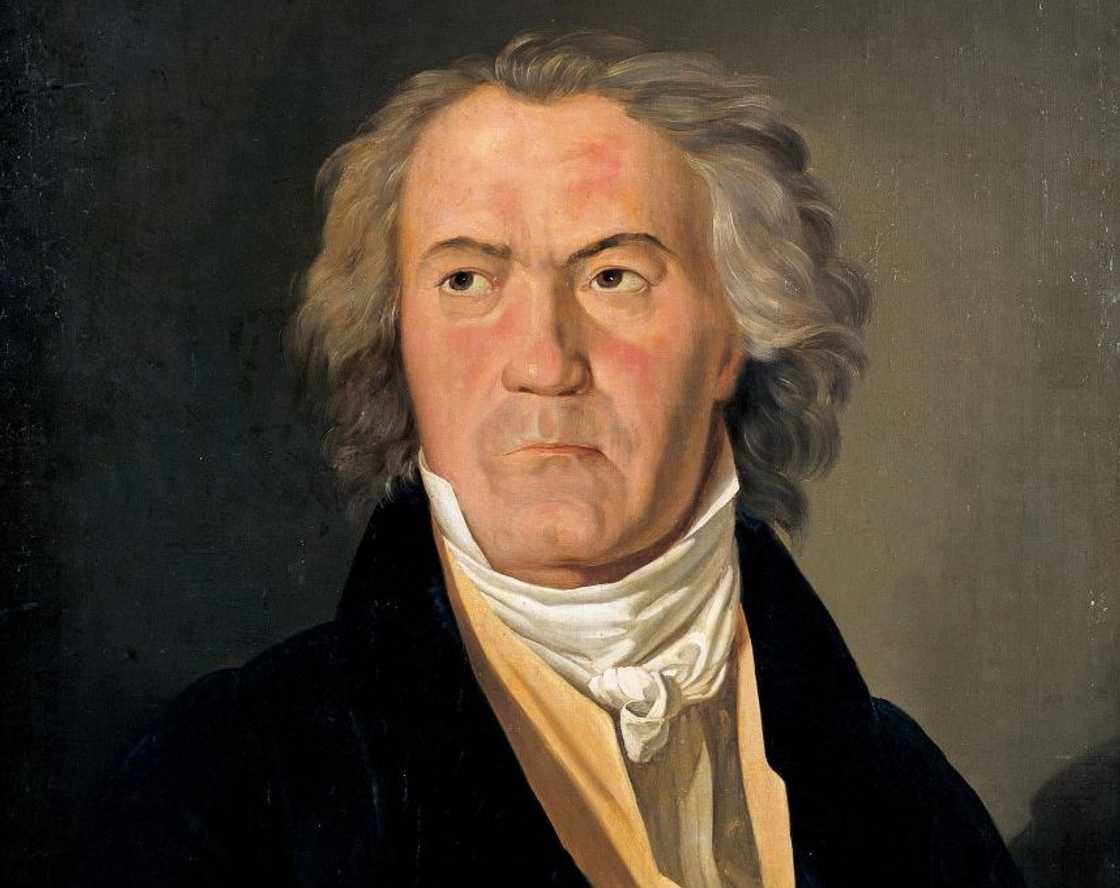Was Beethoven black? The facts behind the composer's heritage
One famous composer the world always seems to need more of is Beethoven. He is talked about in the realm of legends such as Johann Sebastian Bach and Wolfgang Amadeus Mozart. However, questions regarding his race have been a recurring issue. So, was Beethoven black?

Source: Getty Images
TABLE OF CONTENTS
The fact of Beethoven's ethnicity has been the subject of scholastic research and investigations. Most of these concluded that he was not black despite several descriptions of him which alluded to his African origin. The explanations rely on the contextual etymology of words such as "moor."
Profile summary
Full name | Ludwig van Beethoven |
Nickname | Der Spagnol' ('The Spaniard') |
Gender | Male |
Date of birth | 17 December 1770 |
Date of death | 26 March 1827 |
Age at death | 56 years old |
Zodiac sign | Sagittarius |
Place of birth | Bonn, Germany |
Place of death | Vienna, Italy |
Nationality | German |
Ethnicity | Flemish |
Religion | Catholic |
Height | 5'6" (165 cm) |
Hair colour | Black |
Eye colour | Dark brown |
Parents | Johann van Beethoven and Maria Magdalena Keverich |
Siblings | Kaspar Anton Karl and Nikolaus Johann |
Profession | Pianist, composer |
Was Beethoven Black?
Most scholars opine that Beethoven's ethnicity had no roots in African ancestry. This is because there is no substantiative proof to back it up. Based on investigations into Beethoven's origins, some believe his family was Flemish.
Was Beethoven white?
Considering Popular Beethoven's standpoint, he was white. This followed an inquiry into his genealogy, which traces his family's origins to Flemish ancestry, dating back several centuries.

Source: Original
Some scholars have further argued that attempts to ascribe African origin to Beethoven risk outweighing the checkable contributions of Black composers and musicians throughout history.
What did Beethoven look like?
The composer was depicted as having a darker complexion, broad features, and hair type equated to people of African descent. Words like "Moor," used to describe the late composer, often refer broadly to people from North Africa or the Iberian Peninsula. These have contributed to assumptions about his racial ancestry.
Samuel Coleridge-Taylor, a mixed-race composer and orchestra conductor, according to Beethoven Scholar, remarked on the similarities between Beethoven's facial attributes and those of Africans. However, this lacks tangible genealogical backing linking his family tree to North Africa or Moorish ancestry.
Who were Beethoven's parents?
Ludwig van's father was Johann van Beethoven. An Explore Classical Music article described him as a singer and a court musician who played a notable part in Beethoven's early musical education and career development.
Did Beethoven have a black mother?
His mother, Maria Magdalena Keverich, does not have black ancestry. She allegedly came from a lineage of cooks in Ehrenbreitstein.
Theories about Beethoven's blackness
There are various views on the composer's ethnicity. Some of them acquire credence in the following:
Type of music
Advocates of the theory opine that the composer's music exhibits rhythmic sophistication similar to those of West African traditions. The syncopation in some of his notes' arrangements has been pinpointed as evidence of probable cross-cultural influences.

Source: Getty Images
Critics have countered such a notion by claiming that rhythmic elements were present in African music and European musical techniques at the time.
Friendship with George Bridgetower
A significant element of the ethnic controversy concerns the late composer's association with George Bridgetower, an Afro-European violinist and composer. The duo even worked together on the Kreutzer Sonata, initially dedicated to Bridgetower but re-dedicated to someone else after they stopped talking.
Ludwig and Bridgetower's friendship is inferential evidence of the former's possible multiracial identity.
Social-cultural implication
In a post on The Conversation, the discussion over Beethoven's race intersects with broader conversations on cultural representation and historical revisionism. Champions of the theory about the musician's African roots argue that it questions traditional Eurocentric portrayals in classical music.
To them, it emphasises the contributions of marginalised groups to cultural heritage. On the other hand, critics have cautioned against "blackwashing" historical figures as it may detract from spotlighting genuine achievements of composers and musicians of African descent.
As the Los Angeles Times explained, in the context of modern-day racial conversations, the "Beethoven was Black" trope has impacted social justice movements like Black Lives Matter. It reflects the unending measures to review history through a lens recognising various cultural challenges rooted in narratives of cultural superiority.

Source: Getty Images
Frequently asked questions
The late pianist's fame is such that it has attracted the interest of individuals from different races. It is no wonder why his ethnicity often comes under scrutiny. Some questions about him and the best answers given include the following:
- What was Beethoven's complexion? He was described as having dark features.
- What ethnicity was Ludwig van Beethoven? He was Flemish.
- Is there any evidence that Beethoven was black? There is no genealogical evidence of the composer's African ancestry theory.
- Who was the first black composer of classical music? Joseph Bologne, Chevalier de Saint-Georges, is the first-known classical music composer of African roots.
- When was Beethoven born? He was born on 17 December 1770.
Questions such as "Was Beethoven black?" will not go away. This is not because there is no concrete evidence to back the argument in the affirmative but because of its impact on trendy social challenges.
READ ALSO: Why did Johnny Cash disinherit his daughters? Facts you need to know
As published on Briefly, Johnny Cash won many fans' hearts with his unique voice and lyrics. He was also one of the best music artists of the 20th century and was known for his wealth and influence.
The discovery that his daughters did not have a fair share of his properties and wealth after he died shocked many. Many keep asking, 'Why did Johnny Cash disinherit his daughters?' and we have the answers.
Source: Briefly News






